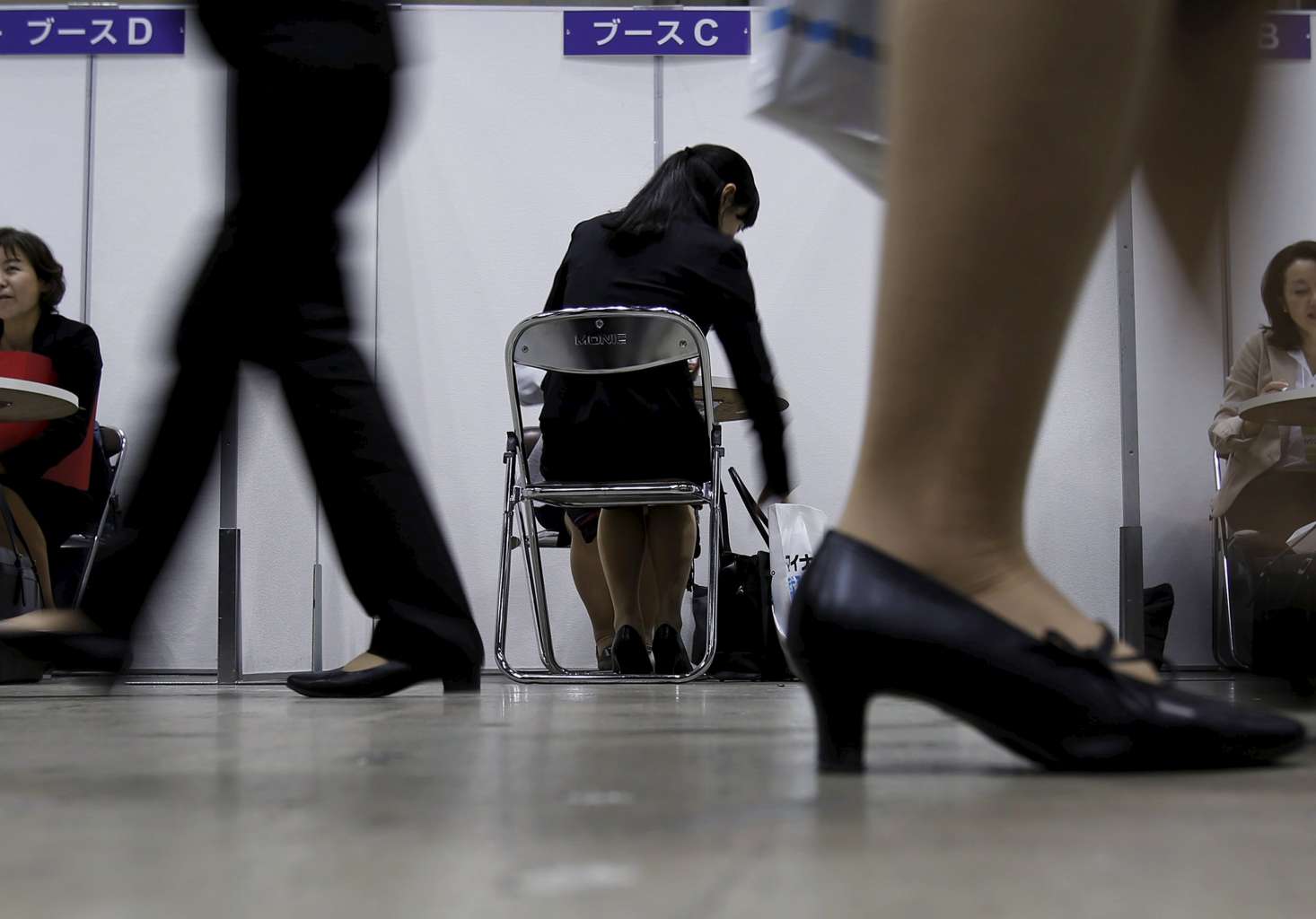Dead for dough: Death by overwork around the world
Sign up now: Get ST's newsletters delivered to your inbox

A job seeker participating in a job hunting counselling session at a job fair for fresh graduates in Tokyo, Japan, on March 20, 2016.
PHOTO: REUTERS
This story was first published on April 6, 2016, and was updated on Oct 6, 2017.
Japan is witnessing a record number of compensation claims related to death from overwork and suicides due to workplace stress.
Previously, white-collar, male workers were common victims. But recent statistics reveal that younger and female employees are also falling prey to the problem.
The phenomenon is called karoshi. Karo means "overwork" and shi means "death", in Japanese.
Two types of karoshi are recognised by Japan's Labour Ministry. One is death due to cardiovascular illness linked to overwork. The other is if the person commits suicide due to work-related mental stress.
However, Japan is not the only country that has seen cases of work-related deaths. Here is a look at six cases from different countries including Japan.
1. Miwa Sado, 31, reporter in Japan
NHK reporter Miwa Sado, 31, who had been covering political news in Tokyo, was found dead in her bed in July 2013, reportedly clutching her mobile phone. She had died of heart failure after logging 159 hours of overtime in a month.
A government inquest a year after her death ruled that it was linked to excessive overtime. She had taken two days off in the month before she died. NHK eventually made the case public four years later, bowing to pressure from Sado's parents to take action to prevent a recurrence.
"We are sorry that we lost an excellent reporter and take seriously the fact that her death was recognised as work-related," President Ryoichi Ueda said on Oct 5. "We will continue to work for reform in cooperation with her parents," he told reporters.
2. Toshitsugu Yagi, 43, advertising executive in Japan
Mr Toshitsugu Yagi's death in 1987 was not recognised by the Labour Ministry as one that was caused by overwork. That was because it said he had not worked for 24 hours continuously, or put in at least 16 hours daily for seven consecutive days before he collapsed.
But the poems he left behind spoke volumes of the stress he was under.
"Can't it be said that today's armies of corporate workers are in fact slaves in every sense of the word? They are bought for money. Their worth is measured in working hours. They are powerless to defy their superiors. And these corporate slaves of today don't even share the simplest pleasures that forced laborers of ages past enjoyed: the right to sit down at the dinner table with their families," he wrote.
3. Kenichi Uchino, 30, quality manager at Toyota
The Nagoya District Court in Japan ruled that Kenichi Uchino, 30, had worked some 106 hours of overtime in the month before he died. The Toyota quality control manager suddenly suffered heart failure at work on Feb 9, 2002. His wife said long working hours had caused Mr Uchino to develop an abnormal heart rhythm.
The case received widespread attention when she succeeded in meeting the minister of labour after spending more than six years fighting for monetary compensation. The ministry had previously rejected her application for bereaved family benefits, saying the death was not due to overwork.
On Nov 30, 2007, the Nagoya court ruled in her favour. Mr Uchino "was so tired that he could not play with his children", the presiding judge said. The family now receives about 4.4 million yen (S$53,000) every year, according to The Economic Times.
4. Workers at France Telecom

Between 2008 and 2009, some 35 workers of France Telecom, a French telecommunications company now known as Orange, committed suicide, prompting then boss Didier Lombard to step down. Many of the employees had left notes that said work stress and management decisions were to be blamed for their deaths.
In a letter addressed to his wife and sons, aged 12 and eight, one of the workers, Mr Jean-Paul Rouannet, 51, explained that he could no longer stand the work conditions.
"Everything the employee (at France Telecom) does is counted: when he or she goes to the toilet; when he eats; when he smokes a cigarette. The workers are even made to wear Wi-Fi ear and mouth pieces so they can deal with calls during their breaks," a trade union representative said, according to The Independent.
5. Workers at Foxconn factory in China

Employees working on the assembly line at Taiwanese manufacturer Foxconn's plant in Shenzhen, China.
PHOTO: BLOOMBERG NEWS
In 2010, 18 Foxconn workers in China attempted suicide, citing long and poor working conditions. Fourteen of them died. Foxconn is China's largest factory and produces iPhone and iPad parts for Apple.
All the workers were below the age of 25. One of the four who survived was Ms Tian Yu. She recalled that staff were forced to say "Good! Very Good! Very, very good!" every morning, when managers asked them how they were doing. They then worked in silence for up to 12 hours a day, six days a week.
After her suicide attempt Tian Yu was paralysed from the waist down. She received 180,000 yuan (S$37,000) as compensation.
6. Moritz Erhardt, 21, intern at Bank of America Merril Lynch in London

Fellow interns called him "Superstar'" because of the hard work the 21-year-old German intern put in at the London office of Bank of America Merrill Lynch.
On average, interns in this industry work 20 hours a day, according to Reuters.
When he died on Aug 15, 2013, Erhardt had been working for 72 hours straight. A lack of sleep increases the risk of seizures and Erhardt was already taking medication to control his epilepsy.
After returning to his London residential quarters, he had a seizure in the shower and died. The tragedy prompted major banks to re-examine their working conditions.
7. Mita Diran, 24, copy editor at an advertising company in Indonesia
Ms Mita Diran, 24, slipped into a coma and died on Dec 15, 2013, after weeks of late nights at work. The Indonesian worked as a copy editor for Young & Rubicam, an advertising agency under multinational public relations company WPP. She often tweeted about her hectic work schedule and surviving on energy drinks to get her through late nights at work. Ironically, hours before her death, she had tweeted, "30 hours of work and still going strooong".
Sources: Japan Times, The Guardian, NY Daily News, Reuters, The Independent, The Economic Times


